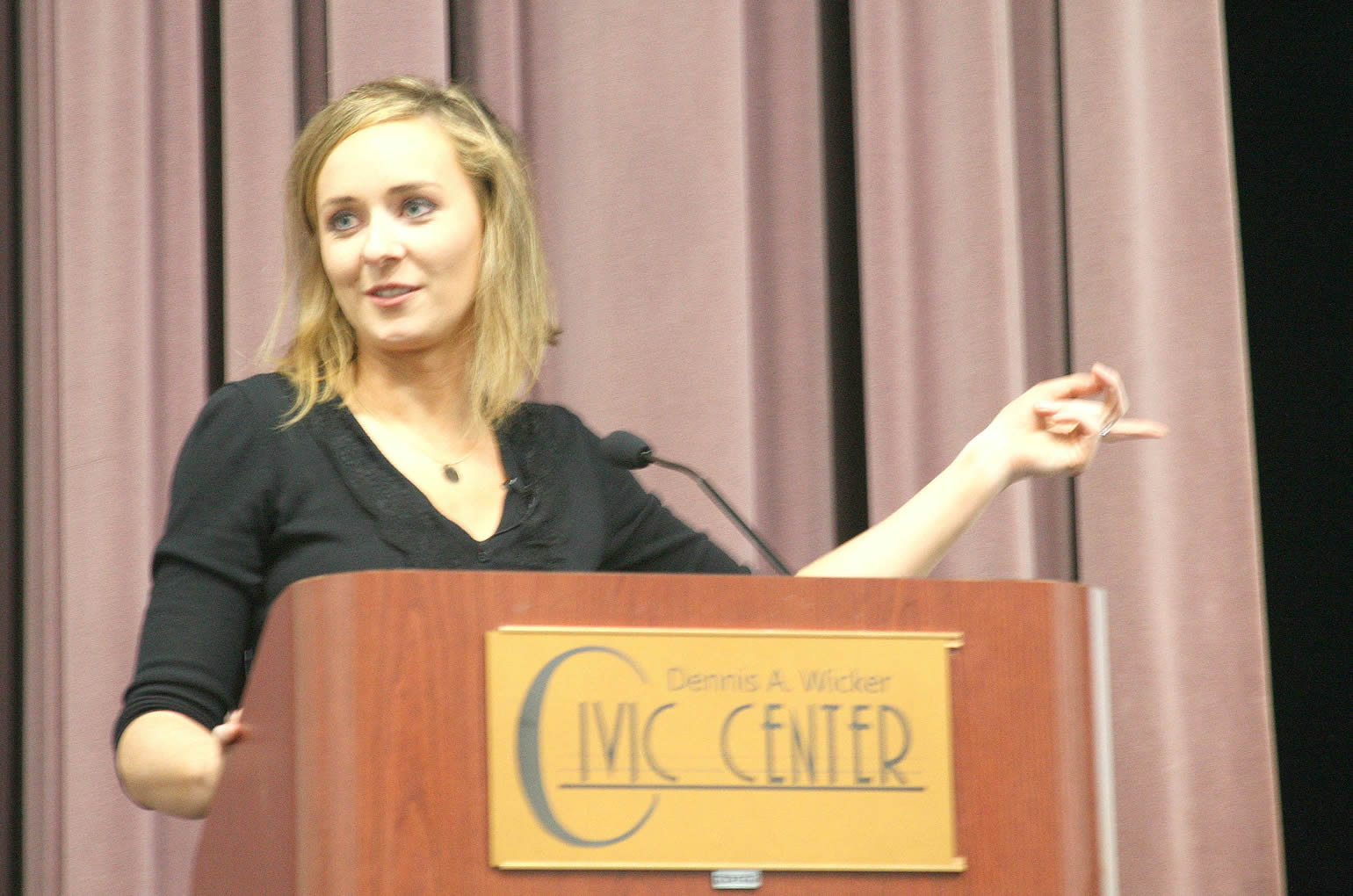
Dr. Anna Egalite, an N.C. State University education professor, spoke on "School Choice: Landscape, Theory and Research" as part of the Liberty Lecture Series sponsored by Central Carolina Community College.

SANFORD - School choice takes many forms and offers benefits across the board - for students using vouchers to attend private schools to others opting for their traditional public school - according to Dr. Anna Egalite, an N.C. State University education professor speaking on Wednesday, March 30, at the Dennis A. Wicker Civic Center.
"School Choice: Landscape, Theory and Research" was part of the Liberty Lecture Series sponsored by Central Carolina Community College, a program highlighting ideas that expand freedom, liberty, and well-being for mankind.
While many think of school choice as something radical and new, Dr. Egalite said it's actually been part of the American landscape for generations. In more familiar cases, parents have enrolled their children in private schools, paying for their education out of pocket. But it can take a more subtle form, as well, when families choose a place to live based on the neighborhood school.
"Choice is always present in the United States in education," said Dr. Egalite, who was raised and educated in Ireland, where all schools are privately operated, but government funded. "When we talk about introducing it, we're actually talking about expanding it."
Dr. Egalite described a catalog of policies for expanding school choice that are already being offered in North Carolina and other states. Some of them - including magnet schools and the option to choose from schools within a local district - are offered squarely within the traditional public school structure. Others like charter schools, homeschooling, and private schools paid with a voucher provided by the government can break that traditional mold.
Some options can seem radical, though many of the more controversial policies are not very common. Dr. Egalite said that private education funded by income tax credits or government vouchers is one example. That kind of school choice gets a lot of public attention and debate, though it's used by less than 1 percent of all students.
For most of her hourlong presentation, Dr. Egalite described common philosophical arguments for school choice and how those ideas influence the kind of policy developed, presented an array of statistics describing how common various policies are across the United States, and summarized the latest research showing the impact of school choice on students.
Her conclusion: Data show that policies expanding school choice have been overwhelmingly positive.
While research on student test scores shows uneven and modest gains, other outcomes of school choice had greater improvement. In one study, 91 percent of students attending private school with a voucher graduated from high school, a figure 21 percentage points higher than those who did not. In New York City, 45 percent of students attending private school with a voucher enrolled in college, compared with 36 percent of students who did not.
Dr. Egalite said test scores - or what the research calls "student achievement" - are a consideration, but they don't tell the whole story for school choice policies. Parents choose schools for a variety of reasons. Perhaps they're close to home, teach important values, offer particular extracurricular activities, or meet other educational goals.
"I think graduating from school is more important than getting a 60 instead of a 50 percent on the state test," she said.
Dr. Egalite said school choice also offers other social benefits, including social integration and cost savings. The former elementary teacher and policy analyst said that social integration often is used as an argument against school choice. But using established voucher programs in Milwaukee and other cities as an example, Dr. Egalite said school choice policies can "break the connection between schools and homes," drawing students out of more affluent neighborhoods into schools that are more demographically diverse.
Though most research has focused on the impact of school choice on students who opt for other types of schooling, Dr. Egalite said even traditional schools appear to benefit from choice policies. Among the research she discussed was a study of her own summarizing existing findings on the effect of competition among schools. Her conclusion: Traditional public schools performed better after a voucher policy was introduced.
Dr. Egalite ended by reminding the audience that families are already sending children to private schools and selecting a school by choosing where to live. "We will always have school choice in this country," she said. "The question is who gets to access it."
The school choice presentation was the second in this year's Liberty Lecture Series. N.C. State Professor Andrew Taylor's presentation titled "American Republic" launched this season's series in the fall. Chad Adams, host of "What Matters," an Internet radio program, discusses politics and the media on April 21.

Dr. Anna Egalite, an N.C. State University education professor, spoke on "School Choice: Landscape, Theory and Research" as part of the Liberty Lecture Series sponsored by Central Carolina Community College.